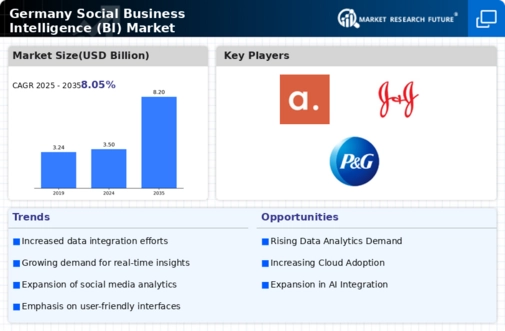Rise of Social Media Analytics
The proliferation of social media platforms in Germany has catalyzed the growth of the social business intelligence market. Companies are increasingly utilizing social media analytics to gauge customer sentiment, monitor brand reputation, and identify emerging trends. Recent data suggests that over 60 percent of German businesses are integrating social media analytics into their marketing strategies, reflecting a significant shift towards understanding consumer behavior through digital channels. This trend not only enhances customer engagement but also provides valuable insights that inform product development and marketing campaigns. As organizations continue to prioritize social media as a critical touchpoint, the demand for sophisticated analytics tools that can process and interpret social media data is expected to escalate, further propelling the growth of the social business intelligence market.
Growing Demand for Data-Driven Decision Making
The Germany social business intelligence market is experiencing a notable surge in demand for data-driven decision-making processes. Organizations across various sectors are increasingly recognizing the value of leveraging data analytics to enhance operational efficiency and strategic planning. According to recent statistics, approximately 70 percent of German companies have adopted some form of data analytics, indicating a robust trend towards data-centric business models. This shift is likely to drive investments in social business intelligence tools that facilitate real-time data analysis and visualization, enabling companies to make informed decisions swiftly. Furthermore, the emphasis on data-driven insights is expected to foster a competitive landscape, compelling businesses to adopt advanced analytics solutions to stay ahead in the market.
Emphasis on Regulatory Compliance and Data Privacy
In the context of the Germany social business intelligence market, regulatory compliance and data privacy have emerged as pivotal drivers. The implementation of stringent data protection regulations, such as the General Data Protection Regulation (GDPR), has compelled organizations to adopt robust data governance frameworks. Companies are increasingly investing in social business intelligence solutions that not only provide analytical capabilities but also ensure compliance with legal standards. This focus on data privacy is likely to shape the development of analytics tools that prioritize secure data handling and user consent. As businesses navigate the complexities of regulatory requirements, the demand for compliant social business intelligence solutions is expected to rise, influencing market dynamics significantly.
Increased Investment in Business Intelligence Solutions
The Germany social business intelligence market is witnessing a significant increase in investment in business intelligence solutions. Organizations are allocating substantial budgets towards acquiring advanced analytics tools that facilitate data visualization, reporting, and performance management. Recent market analysis reveals that the business intelligence software market in Germany is projected to grow at a compound annual growth rate (CAGR) of 10 percent over the next five years. This trend underscores the recognition of business intelligence as a critical component of organizational strategy. As companies strive to enhance their analytical capabilities, the influx of investment is likely to drive innovation and the development of more sophisticated social business intelligence solutions, ultimately shaping the future landscape of the market.
Integration of Artificial Intelligence and Machine Learning
The integration of artificial intelligence (AI) and machine learning (ML) technologies is transforming the Germany social business intelligence market. These advanced technologies enable organizations to automate data analysis processes, uncover hidden patterns, and generate predictive insights. Recent studies indicate that approximately 50 percent of German companies are exploring AI-driven analytics solutions to enhance their decision-making capabilities. The potential for AI and ML to process vast amounts of data efficiently is likely to drive the adoption of innovative social business intelligence tools. As businesses seek to leverage these technologies for competitive advantage, the market for AI-enhanced analytics solutions is expected to expand, fostering a new era of data intelligence in Germany.













